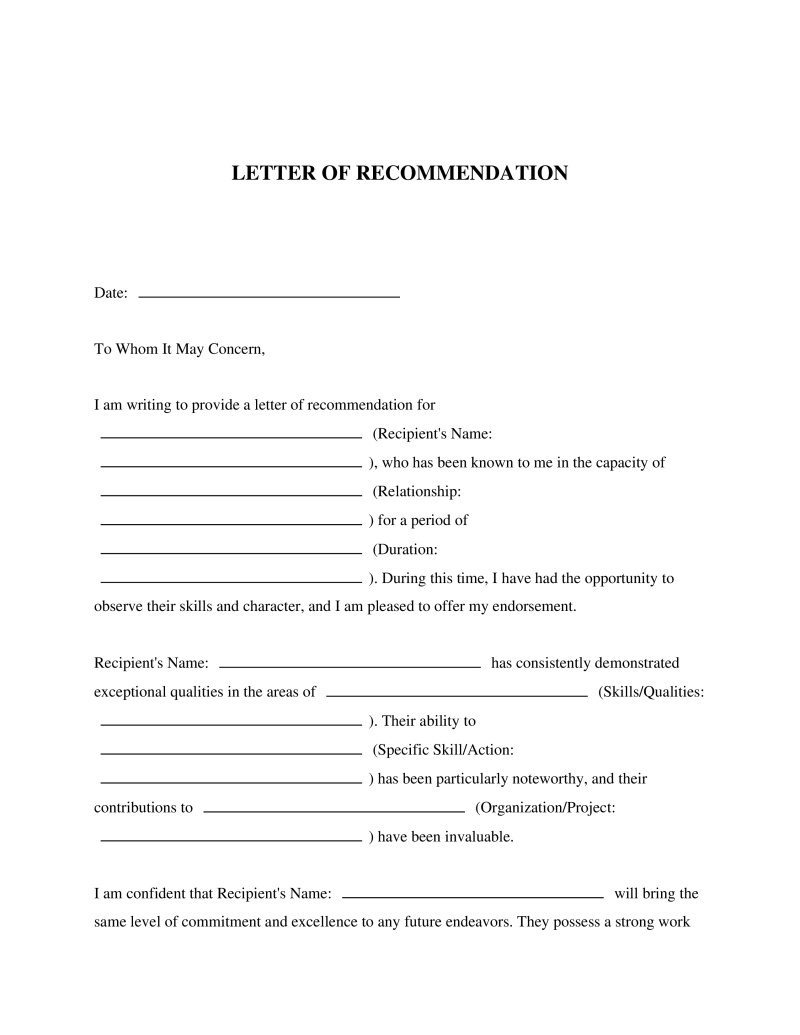A letter of recommendation is a written endorsement from someone who vouches for a person's qualifications, skills, or character.
Applicant Full Name
Write your full legal name as it appears on your official identification, including your first name, middle name (if applicable), and last name. For example, if your name is John Michael Smith, you should write “John Michael Smith.” This name will be used on all legal documents, so it must be accurate.

Table of Contents
What is a Letter of Recommendation?
A Letter of Recommendation is a document written by a person who is in a position of authority or has a certain level of expertise, aimed at endorsing the skills, achievements, and qualities of an individual. This document plays a critical role in various application processes, providing a third-party perspective on an applicant's capabilities and potential. It's particularly sought after by students applying for higher education, job seekers aiming to secure positions, and professionals seeking advancement or new opportunities. The essence of this letter lies in its ability to persuade and inform decision-makers about the candidate's suitability for a specific role or opportunity, making it an invaluable asset for anyone looking to make a significant step forward in their career or academic journey.
Key Features
Important Provisions
- The writer’s credentials that establish their authority or relevance to speak on behalf of the candidate.
- Specific examples showcasing the candidate's skills, achievements, and qualifications.
- A clear statement endorsing the candidate for the specific opportunity they are applying for.
- Any limitations on the endorsement or conditions under which it was given.
Pros and Cons
Pros
- +Enhances the applicant’s profile by adding credibility through external validation.
- +Provides a comprehensive overview of the candidate’s capabilities beyond what resumes or CVs can convey.
- +Helps decision-makers understand the applicant's character and work ethic from another perspective.
- +Can be decisive in situations where candidates have similar qualifications or experiences.
- +Serves as a versatile tool that can be adapted for various applications across academic, professional, and other fields.
Cons
- -Relies heavily on the reputability and writing skills of the person providing the recommendation.
- -May not be as impactful if not tailored specifically to the opportunity or if it lacks specific examples.
- -Requires time and effort from both the requestor and writer, which could lead to delays if not managed properly.
Common Uses
- Academic applications, including college admissions, scholarship opportunities, or research grants.
- Job applications, especially for positions that require a high level of trust or specialized skills.
- Professional license applications or certifications within various industries.
- Volunteer positions requiring proof of character or expertise.
- Promotion considerations within an organization.
- Board appointments or leadership roles in non-profit organizations.
- Mentorship programs requiring proven experience or skill sets.
Frequently Asked Questions
Do you have a question about a Letter of Recommendation?
Example questions:
Not the form you're looking for?
Try our legal document generator to create a custom document
Community Discussion
Share your experience and help others
Legal Notice: Comments are personal opinions and do not constitute legal advice. Always consult a qualified attorney for matters specific to your situation.
Comments (0)
Leave a Comment
No comments yet. Be the first to comment!